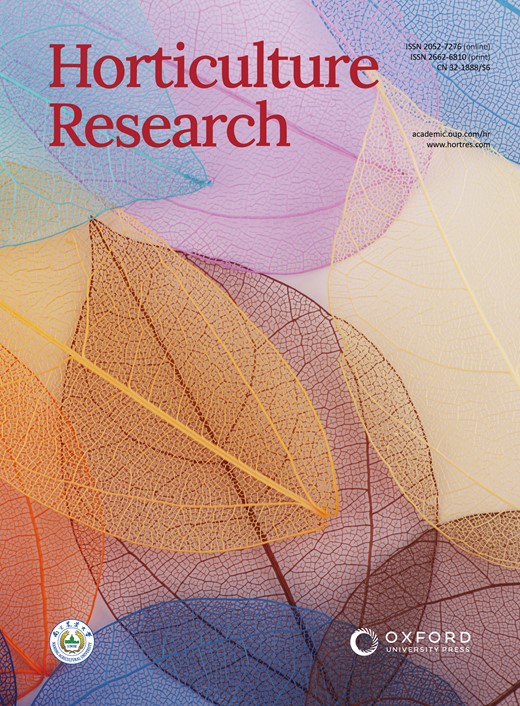AP2转录因子CsAIL6通过与WD40蛋白CsAN11相互作用负向调控柑橘果实中柠檬酸的积累
IF 8.7
1区 农林科学
Q1 Agricultural and Biological Sciences
引用次数: 0
摘要
柠檬酸积累是柑橘类水果的一个重要过程,决定了水果的风味和适销性。MBW复合转录因子基因CsAN11、CsAN1和CsPH4在柠檬酸积累调控中起关键作用。如何调控CsAN1或CsPH4已被广泛研究,但对CsAN11调控的研究却很少。在本研究中,我们鉴定了AP2/ERF (APETALA2/乙烯反应因子)转录因子基因CsAIL6,该基因在高酸柑橘品种中低表达,在低酸柑橘品种中高表达。过表达CsAIL6可显著降低柑橘果实、愈伤组织和番茄中柠檬酸的含量,而沉默CsAIL6可显著提高果实中柠檬酸的含量。此外,沉默CsAIL6后,CsAN11、CsAN1和CsPH4的转录水平显著升高;过表达CsAIL6后,只有CsAN11的转录水平显著降低。同样,只有在CsAIL6稳定过表达的果实中,番茄AN11 (SIAN11)转录水平显著低于WT果实。进一步实验发现,过表达CsAN11显著提高了有机酸含量,但对CsAIL6转录物水平无明显影响;此外,CsAIL6仅与CsAN11相互作用,而不与MBW复合物的CsAN1和CsPH4相互作用。综上所述,我们的研究结果验证了CsAIL6通过直接与WD40蛋白CsAN11相互作用负向调控柠檬酸积累,这为通过调控MBW复合物调控果实中柠檬酸积累提供了新的机制。本文章由计算机程序翻译,如有差异,请以英文原文为准。
The AP2 transcription factor CsAIL6 negatively regulates citric acid accumulation in citrus fruits by interacting with a WD40 protein CsAN11
Citric acid accumulation is an essential process in citrus fruits that determines fruit flavor and marketability. The MBW complex transcription factor genes, CsAN11, CsAN1, and CsPH4 play key roles in regulating citric acid accumulation. Although how to regulate CsAN1 or CsPH4 was widely investigated, studies on the regulation of CsAN11 are scarce. In this study, we characterized the AP2/ERF (APETALA2/ethylene response factor) transcription factor gene CsAIL6, which is lowly expressed in high-acid citrus varieties and highly expressed in low-acid citrus varieties. Overexpressing CsAIL6 obviously decreased the citric acid content in citrus fruits, calli or tomatoes, whereas silencing CsAIL6 significantly increased the fruit citric acid content. Additionally, transcript levels of CsAN11, CsAN1, and CsPH4 were significantly increased by silencing CsAIL6; only the CsAN11 transcript level was significantly decreased by overexpressing CsAIL6. Similarly, only the tomato AN11 (SIAN11) transcript level in CsAIL6 stably overexpressing fruits was markedly lower than that in WT fruits. Further experiments revealed that overexpressing CsAN11 significantly increased the organic acid content but had no obvious influence on the CsAIL6 transcript level; in addition, CsAIL6 only interacts with CsAN11, rather than with CsAN1 and CsPH4 of the MBW complex. Taken together, our findings verified that CsAIL6 negatively regulates citric acid accumulation through directly interacting with the WD40 protein CsAN11, which provides a new mechanism for citric acid accumulation in fruits through the regulation of the MBW complex.
求助全文
通过发布文献求助,成功后即可免费获取论文全文。
去求助
来源期刊

Horticulture Research
Biochemistry, Genetics and Molecular Biology-Biochemistry
CiteScore
11.20
自引率
6.90%
发文量
367
审稿时长
20 weeks
期刊介绍:
Horticulture Research, an open access journal affiliated with Nanjing Agricultural University, has achieved the prestigious ranking of number one in the Horticulture category of the Journal Citation Reports ™ from Clarivate, 2022. As a leading publication in the field, the journal is dedicated to disseminating original research articles, comprehensive reviews, insightful perspectives, thought-provoking comments, and valuable correspondence articles and letters to the editor. Its scope encompasses all vital aspects of horticultural plants and disciplines, such as biotechnology, breeding, cellular and molecular biology, evolution, genetics, inter-species interactions, physiology, and the origination and domestication of crops.
 求助内容:
求助内容: 应助结果提醒方式:
应助结果提醒方式:


